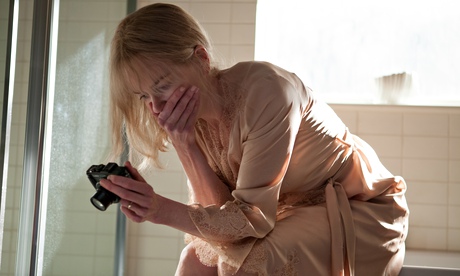
The last time Nicole Kidman made headlines, she was starring in Grace of Monaco, a "worse than Diana" disaster that Kidman presumably wishes she could forget – as do most of the people who saw it. In this dourly lively amnesiac thriller from the director of 2010's unmemorable Brighton Rock remake, that wish comes true. Not only does Kidman play a character who cannot recall her own life from one day to the next, she plays it well enough to expunge the memory of Olivier Dahan's right royal catastrophe, and to remind us just how good she was at playing borderline bewildered in the career-high psycho-chiller The Others.
Kidman is Christine, a middle-aged woman who wakes every morning with no memory of her life from her mid-20s onwards. Recognising neither the man in her bed nor her own face in the mirror, Christine must begin every day with a catch-up lesson delivered in tired but endlessly patient tones by Ben (Colin Firth): he is her husband; she was in an accident; she has amnesia; tonight she will fall asleep and forget everything – again. On the wall of their bathroom, photographs tell the story of a life lost; of romance, marriage, holidays – mementoes of an unremembered past. But while Ben is out at work, a phone call from the mysterious Dr Nasch (Mark Strong) alerts Christine to the existence of a camera on which she has been keeping a secret video diary. According to Nasch, Christine was the victim of a brutal attack, the details of which her husband is hiding. Whom should she trust – her oddly evasive spouse or the not-so-good doctor?
Film theorists have long claimed that the medium of cinema somehow mirrors the strange function of memory, so it's no surprise that amnesiac narratives have proved endlessly popular on the silver screen. From the stylish mysteries of Hitchcock's Spellbound to the art-house thrills of Memento, the horrors of Angel Heart, the sci-fi experiments of Total Recall, the tragicomic heartbreak of Eternal Sunshine of the Spotless Mind, and even the goofy romance of 50 First Dates, memory – or the lack of it – has provided a nifty plot device for a dazzling array of cinematic crowd-pleasers. Riffs from several of those disparate titles are weirdly identifiable in writer-director Rowan Joffe's enjoyably preposterous suspenser, which subtly misremembers SJ Watson's 2011 source bestseller. Most rewardingly, Joffe's screenplay transforms the written journal entries of Watson's source into a video diary, smartly facilitating a smooth transition from page to screen as Christine is confronted with moving images of her forgotten self. Yet the footage that kept unspooling in my own forgetful mind was from Wolfgang Petersen's Shattered, an underrated adaption of Richard Neely's novel, which draws heavily on the "amnesia noir" flicks of the 40s, and closely prefigures the enjoyable twists and turns of Before I Go to Sleep. I don't know whether Joffe is familiar with Petersen's 1991 oddity but his film certainly seems to remember it well.
Part of the fun is seeing just how far Joffe can push the elegant contrivance of Watson's source without tipping over into psychobabbling farce. With its muted palette and close-quarters, hand-held cinematography, this deliberately subdued romp smartly counterbalances the arch theatricality of its narrative with a downbeat suburban pallor that lends credibility to the incredible, persuading us to suspend our disbelief just long enough to enjoy its ticklish visceral thrills and snaky narrative puzzles.
It helps that the three central performances are top-notch. Kidman conveys both tremulous uncertainty and creeping paranoia with aplomb; Colin Firth twists his understated screen charm to deliciously subversive ends; and Mark Strong cements his reputation as one of modern cinema's most hypnotically unpredictable presences. As the narrative flips hither and yon, its genre-ego and psychoanalytic-id doing battle to entertaining effect, the key players vacillate between the sympathetic and the sinister, the paranoid and the perceptive, with understated ease. (Which reminds me; this film also made me forget the creakiness of the Firth/Kidman coupling in the recent drama The Railway Man – another plus point.)
Beneath all the overcooked silliness there's a hint of something melancholic – an awareness of the awful beauty of living life one day at a time, past and future erased by the simple act of sleep. As Christine wrestles with the philosophical conundrums of her situation, I found myself recalling the final act from Steven Spielberg's much maligned sci-fi film A.I., in which a mother and child can only be reunited by the obliteration of a terrible past and the absence of a tangible future; a memory made real, for one day only.
None of which is to say that Before I Go To Sleep is either as profound or insightful as many of its predecessors; it isn't – it's solidly superficial. But it's an enjoyable shaggy dog story with a twist that will leave you with the strange feeling that you've seen all this before, even if you can't quite remember where.

